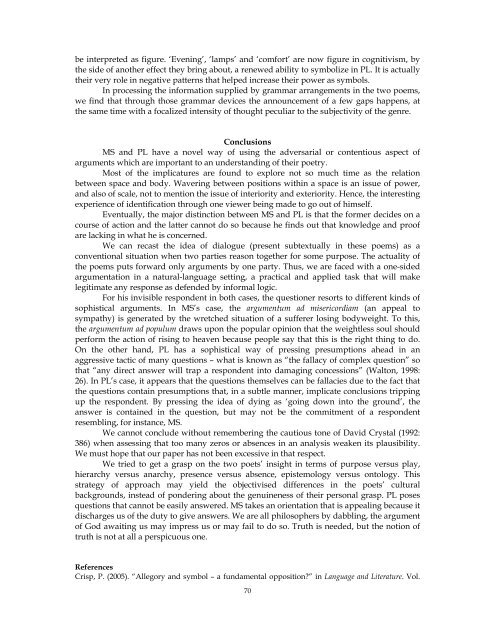You also want an ePaper? Increase the reach of your titles
YUMPU automatically turns print PDFs into web optimized ePapers that Google loves.
e interpreted as figure. ‘Evening’, ‘lamps’ and ‘comfort’ are now figure in cognitivism, by<br />
the si<strong>de</strong> of another effect they bring about, a renewed ability to symbolize in PL. It is actually<br />
their very role in negative patterns that helped increase their power as symbols.<br />
In processing the information supplied by grammar arrangements in the two poems,<br />
we find that through those grammar <strong>de</strong>vices the announcement of a few gaps happens, at<br />
the same time with a focalized intensity of thought peculiar to the subjectivity of the genre.<br />
Conclusions<br />
MS and PL have a novel way of using the adversarial or contentious aspect of<br />
arguments which are important to an un<strong>de</strong>rstanding of their poetry.<br />
Most of the implicatures are found to explore not so much time as the relation<br />
between space and body. Wavering between positions within a space is an issue of power,<br />
and also of scale, not to mention the issue of interiority and exteriority. Hence, the interesting<br />
experience of i<strong>de</strong>ntification through one viewer being ma<strong>de</strong> to go out of himself.<br />
Eventually, the major distinction between MS and PL is that the former <strong>de</strong>ci<strong>de</strong>s on a<br />
course of action and the latter cannot do so because he finds out that knowledge and proof<br />
are lacking in what he is concerned.<br />
We can recast the i<strong>de</strong>a of dialogue (present sub<strong>text</strong>ually in these poems) as a<br />
conventional situation when two parties reason together for some purpose. The actuality of<br />
the poems puts forward only arguments by one party. Thus, we are faced with a one-si<strong>de</strong>d<br />
argumentation in a natural-language setting, a practical and applied task that will make<br />
legitimate any response as <strong>de</strong>fen<strong>de</strong>d by informal logic.<br />
For his invisible respon<strong>de</strong>nt in both cases, the questioner resorts to different kinds of<br />
sophistical arguments. In MS’s case, the argumentum ad misericordiam (an appeal to<br />
sympathy) is generated by the wretched situation of a sufferer losing bodyweight. To this,<br />
the argumentum ad populum draws upon the popular opinion that the weightless soul should<br />
perform the action of rising to heaven because people say that this is the right thing to do.<br />
On the other hand, PL has a sophistical way of pressing presumptions ahead in an<br />
aggressive tactic of many questions – what is known as “the fallacy of complex question” so<br />
that “any direct answer will trap a respon<strong>de</strong>nt into damaging concessions” (Walton, 1998:<br />
26). In PL’s case, it appears that the questions themselves can be fallacies due to the fact that<br />
the questions contain presumptions that, in a subtle manner, implicate conclusions tripping<br />
up the respon<strong>de</strong>nt. By pressing the i<strong>de</strong>a of dying as ‘going down into the ground’, the<br />
answer is contained in the question, but may not be the commitment of a respon<strong>de</strong>nt<br />
resembling, for instance, MS.<br />
We cannot conclu<strong>de</strong> without remembering the cautious tone of David Crystal (1992:<br />
386) when assessing that too many zeros or absences in an analysis weaken its plausibility.<br />
We must hope that our paper has not been excessive in that respect.<br />
We tried to get a grasp on the two poets’ insight in terms of purpose versus play,<br />
hierarchy versus anarchy, presence versus absence, epistemology versus ontology. This<br />
strategy of approach may yield the objectivised differences in the poets’ cultural<br />
backgrounds, instead of pon<strong>de</strong>ring about the genuineness of their personal grasp. PL poses<br />
questions that cannot be easily answered. MS takes an orientation that is appealing because it<br />
discharges us of the duty to give answers. We are all philosophers by dabbling, the argument<br />
of God awaiting us may impress us or may fail to do so. Truth is nee<strong>de</strong>d, but the notion of<br />
truth is not at all a perspicuous one.<br />
References<br />
Crisp, P. (2005). “Allegory and symbol – a fundamental opposition?” in Language and Literature. Vol.<br />
70












